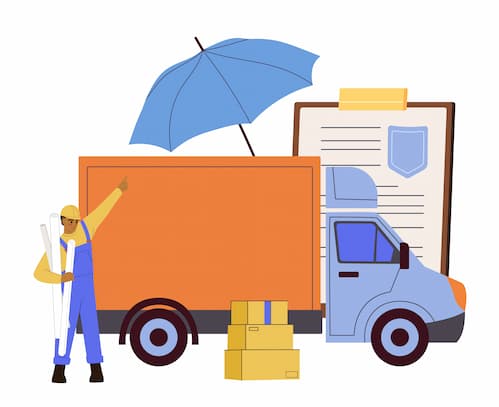- What is commercial property insurance?
- Why do businesses need commercial property insurance coverage?
- How does commercial property insurance work?
- Who needs commercial property insurance?
- Is commercial property insurance required by law?
- What does commercial property insurance cover?
- What isn't covered by commercial property insurance?
- How much does commercial property insurance cost?
- Factors that affect commercial property insurance premiums
- Commercial property insurance companies
- How to buy commercial property insurance
- Common mistakes to avoid when buying commercial property insurance
- How to save on commercial property insurance
- How to file a commercial property insurance claim
- What our expert says
- Commercial property insurance: FAQ's
What is commercial property insurance?
Commercial property insurance provides coverage for business property you own or rent, including buildings, furniture, electronics, inventory, equipment and tools you use in your business.
It can also include personal property at your business that gets damaged in a covered loss, such as your personal vehicle or computer.
This type of commercial property insurance coverage can have different names, including:
- Business hazard insurance
- Business property insurance
- Business personal property insurance
- Business renters insurance
- Commercial building insurance
- Commercial building owners insurance
- Commercial real estate insurance
- Non-residential building insurance

Read your policy carefully. It may include a coinsurance provision, which requires you to insure a percentage of your business property’s value for the insurer to cover it in full in case of a claim. The clause is the company’s way of ensuring you don’t underinsure your property.
Why do businesses need commercial property insurance coverage?
If you own business property, you need commercial property insurance. It provides a crucial layer of financial protection against property damage.
“Helping small businesses recover from commercial property claims has taught me one thing: insurance isn’t just required paperwork — it’s survival gear,” says Colin Ram, a trial attorney with Colin Ram Law, LLC in Mount Pleasant, S.C., who represents small business owners with catastrophic property damage claims.
“When a storm rips through your roof or a fire shuts your doors, the right policy with the right carrier can mean the difference between bouncing back quickly or losing everything you’ve built,” he says. “Property damage isn’t just about fixing walls or replacing lost inventory, it’s about safeguarding livelihoods. Small business owners – and their families – must do everything on their own; a comprehensive insurance policy is like having a partner who steps in when disaster strikes. It’s not just a safety net – it’s peace of mind for my clients.”
How does commercial property insurance work?
Commercial property insurance provides coverage if your business property gets damaged or stolen.
Make sure you understand how your policy works before you file a claim. In the event of a claim, you might only have to pay a deductible, which is a flat amount toward your covered claim expenses. Your insurer covers the rest.
But your policy may also include a coinsurance provision, which requires you to carry insurance for a percentage of your business property’s value in order for the insurer to cover it in full in case of a claim. The clause is the company’s way of ensuring you don’t underinsure your property.
Let’s say your policy has an 80% coinsurance clause, and your buildings, equipment and inventory total $1 million. The coinsurance clause requires you to have coverage of at least $800,000 to get full coverage. If you don’t, you could face a financial penalty when you make a claim, reducing the amount you would have gotten if you fully insured your property.
Who needs commercial property insurance?
Small business owners who lease, own or rent physical commercial locations, operate out of their homes or have equipment should have commercial property insurance. A business property policy protects your physical assets – from buildings to inventory and tools.
Here are a few industries that could benefit from commercial property insurance:
- Construction companies
- Hair or beauty salons
- Retail stores
- Restaurants
- Personal trainers or gyms
- Trucking companies
- Food and beverage companies
Is commercial property insurance required by law?
There are typically no state laws that make commercial property insurance a requirement. That said, if you take out a loan or lease for a building or other property, the lender or landlord will usually require you to have insurance. You’ll likely need to provide proof of insurance coverage to a lender to secure a loan or your landlord before you sign the lease.
What does commercial property insurance cover?
Commercial property insurance coverage provides business asset protection for your business property and buildings. It covers physical assets like:
- Buildings
- Computers
- Electronics
- Equipment
- Fencing
- Furniture
- Glass
- Inventory
- Lighting
- Machinery
- Office supplies
- Personal property
- Signs
- Tools
What isn't covered by commercial property insurance?
Evaluating business insurance policy limitations can help you determine which policy may not meet your coverage needs.
Here are commercial property insurance exclusions your policy typically won’t cover:
- Auto accidents
- Flooding
- Employee injuries
- Mobile equipment
- Goods in transit
- Employee theft
- Equipment malfunctions
- Earthquakes
- Intentional damage you or your employees cause
- Damaged customer property
- Normal wear and tear
- Building foundations
- Animals
- Crops
- Wear and tear
You may have coverage for some of these exclusions if you have the right types of commercial property insurance, such as commercial casualty and commercial flood insurance. Considering scenarios like these can help you determine the types of coverage you need to protect your small business.
How much does commercial property insurance cost?
The average cost of commercial property insurance is $67 per month, according to small business insurance broker Insureon. Around 60% of Insureon customers pay $100 or less for commercial property coverage.
Average commercial property insurance rates by industry
Below are sample monthly rates for various industries, according to Insureon. Bear in mind that rates vary by company. Shopping around or using a broker like Insureon to source quotes can help you find the right policy for your business at an affordable price.
- Real estate: $430
- Sports and fitness: $146
- Wholesale/distribution: $110
- Food/beverage: $103
- Retail: $93
- Manufacturing: $83
- Personal care: $75
- Auto services: $72
- Installation professionals: $63
- Landscaping: $60
- Construction/contracting: $50
- IT/technology: $48
- Healthcare professionals: $46
- Professional services: $45
- Cleaning services: $30
Factors that affect commercial property insurance premiums
Insurance companies consider multiple factors to determine your commercial property insurance rates, including:
- Your business location
- The age and size of the building
- The age and value of your business property
- The type of fire and security protection you have
- Your equipment’s age and value
- Your policy coinsurance clause
- Your coverage types, limits and deductibles
Commercial property insurance companies
If you’re in the market for commercial property insurance, consider getting quotes from the following companies:
- Farmers has dedicated agents who are also small business owners.
- Next offers customized coverage and a fast online application process.
- Progressive has a median cost of $63 per month for a BOP, including commercial property coverage.
- The Hartford insures more than 1.5 million small businesses.
- Thimble is highly-rated by Trustpilot, the review website, with 4.4 out of 5 stars.
- Travelers has been providing commercial insurance for more than 150 years.
- USAA, although coverage is limited to military members and their families.
How to buy commercial property insurance
You can buy commercial property insurance in just a few steps.
- Determine your coverage needs. Make a list of all your physical assets and the value of your business property to get an idea of how much commercial property insurance coverage you need. Consider add-on options that can further protect your business property.
- Gather quotes. Compare quotes from several companies to find companies that offer the best policy coverage at the lowest price.
- Select an insurance company. Consider, in addition to price, a company’s third-party customer satisfaction ratings and financial stability when choosing an insurer.
- Purchase a policy. Submit your application to the company of your choice and make your down payment to secure your coverage.
Common mistakes to avoid when buying commercial property insurance
Avoid making these mistakes when buying business property insurance.
Not assessing your needs thoroughly
Your business has unique risks and requirements, so it's worth evaluating your needs before buying a policy that might not cover all your physical assets. When in doubt, work with an experienced commercial insurance agent to ensure you get the necessary coverage.
Undervaluing your equipment and inventory
If you undervalue your property, you may not have enough coverage in the event of a significant loss, like a fire tearing through your building and destroying all your equipment and inventory.
It may be worth getting an appraisal, especially if you have high-value items, to ensure you can recoup the full value of our assets in case of a major loss.
Not understanding policy exclusions
Make sure to read your entire policy, especially the exclusions section. Talk to your agent if you have concerns or need help understanding the policy. You can discuss any potential gaps in coverage and add additional endorsements to ensure you're covered in the event of a loss.
Only considering price
Although price is important, it shouldn’t be the only factor when choosing a commercial property carrier. The cheapest policy may not have the coverage you need to protect your business. Low-cost policies also typically come with higher deductibles and less favorable terms, which could cause higher than expected out-of-pocket costs if you have to file a claim.
Choosing ACV instead of RCV
You can save money on your policy by choosing an actual cash value (ACV) option instead of a replacement cost value (RCV) option. But it might not be worth it. If you file a claim and have RCV coverage, your policy will pay to replace your damaged items with brand-new items. But if you have ACV coverage, your policy will only pay each item’s depreciated value.
How to save on commercial property insurance
There are many ways to save on commercial property insurance. Here are a few to get you started.
1. Shop around for quotes
After determining your coverage needs, shop around for insurance. You can gather quotes from each company or work with an insurance broker who can do the work for you. Make sure to compare the same coverage types, limits and deductibles to get a true cost comparison.
2. Bundle your policies
Many small business owners need general liability insurance and commercial property coverage. A business owners policy (BOP) can provide both in one policy. Bundling your policies together can usually save you more than buying them separately.
3. Install safety features
You can usually get a discount on your commercial property insurance if you have systems that can mitigate your risk, such as a central burglar alarm or sprinkler system.
4. Perform routine inspections
Schedule routine inspections around your property to address potential problems that could turn into a costly claim. Ensure your alarm and sprinkler system are functioning properly and there aren’t any risks, such as tree limbs over your roof, that could threaten your property.
How to file a commercial property insurance claim
Use this step-by-step guide to file a commercial property insurance claim:
- Document, document, document. Make detailed notes of what happened, when and any relevant incident details. Take clear photos and videos of the damage from all angles and keep receipts and invoices of your damaged property and any repairs you make.
- Review your policy. Before you start the claims process, thoroughly review your policy to understand what it does and doesn’t cover, and any specific limitations or requirements it has. You should also review your insurer’s claims process, documentation requirements and filing deadlines.
- Notify your insurance company. File a claim as soon as possible. Provide all the details and documents you’ve collected and follow your insurer’s instructions closely.
- Mitigate further damage. This may include covering exposed areas, boarding up windows, or temporarily relocating equipment to prevent further damage. Keep detailed records of your mitigation process and receipts for reimbursement.
A claims adjuster will be assigned to your claim to review the damage, verify coverage and determine the value of your loss. Be open and honest and ready to answer any questions the adjuster has. Be prepared to provide access to your property so they can fully assess your claim.

What our expert says
Commercial property insurance: FAQ's
How do I know how much commercial property coverage my business needs?
Inventory your property and value your assets to determine how much commercial property coverage your business needs. Don’t forget to include outdoor fixtures, signs and attached structures. You also should consider whether you want replacement cost or actual cash value.
Does commercial property insurance cover theft or vandalism?
Yes, commercial property insurance policies usually cover theft and vandalism of your business property.
Do I need commercial property insurance if I lease my business premises?
Your landlord will likely require you to have commercial property insurance in order to lease your business premises.
Does commercial property insurance cover natural disasters?
Commercial property insurance helps cover damage to your business location if something like wind, rain, fire, or even flying debris causes harm. It also protects what’s inside, like your inventory, furniture, and equipment. However, standard policies don’t include earthquake or flood damage, so you’d need separate coverage for those.






